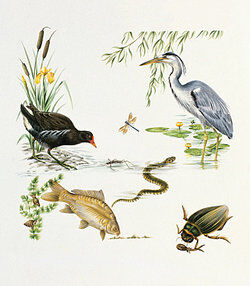Berry Definition
To pick berries.
Origin of Berry
-
From Middle English berye, from Old English beriġe, from Proto-Germanic *bazją (compare German Beere, Danish bær), from Proto-Indo-European *bʰes- (“to blow, chew, rub”) (compare Tocharian B pās- (“to whisper”), Albanian therr (“thorn,”), Ancient Greek ψάω (psaō, “I rub”), Sanskrit बभस्ति (bábhasti, “he chews, devours”)). For the semantic development, compare Old Church Slavonic гроуша (gruša, “pear”), from гроушити (grušiti, “to break, destroy”); Latin pirum (“pear”), from *peis- (“to stick, pound”).
From Wiktionary
-
From Middle English beryen, berien, from Old English *berian (found only in past participle ġebered (“crushed, kneaded, harassed, oppressed, vexed”)), from Proto-Germanic *barjaną (“to beat, hit”), from Proto-Indo-European *bʰer- (“to rip, cut, split, grate”). Cognate with Scots berry, barry (“to thresh, thrash”), German beren (“to beat, knead”), Icelandic berja (“to beat”), Latin feriō (“strike, hit”, verb).
From Wiktionary
-
From Middle English berȝe, berghe, from Old English beorġe, dative form of beorg (“mountain, hill, mound, barrow”), from Proto-Germanic *bergaz (“mountain, hill”). More at barrow.
From Wiktionary
-
Middle English berye from Old English berie bhā-1 in Indo-European roots
From American Heritage Dictionary of the English Language, 5th Edition
-
Variant of Bury and Barry. The given name is also a pet form of names beginning with Ber-.
From Wiktionary
-
From berry, also a pet form of Beryl and Berenice.
From Wiktionary
-
From Middle English bery (“a burrow”). More at burrow.
From Wiktionary
Find Similar Words
Find similar words to berry using the buttons below.





